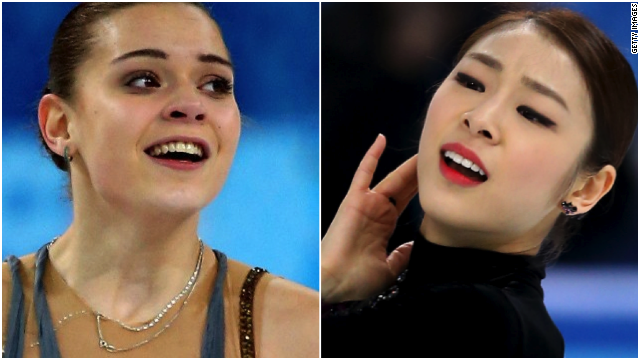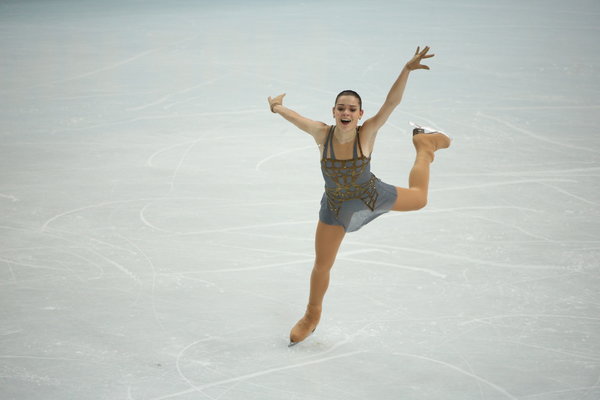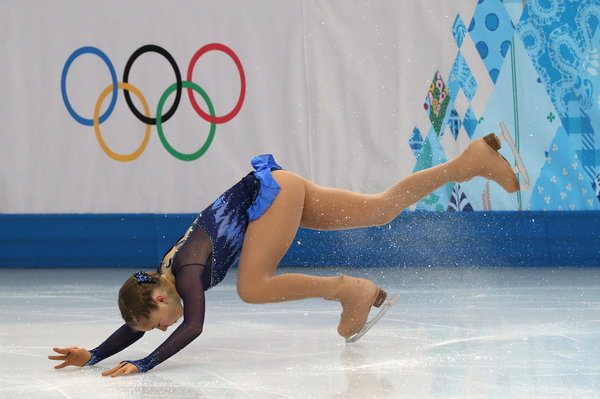|
☞ 'Do you agree with the results???'<NBC> '엄청난 스캔들이다'<LA Times>. 'Home.Ice Advantage'<ESPN>. '또 스캔들?' <프랑스>'Downright Ugly'(완벽한 추태다-CNN).. '아델리나 소트니코바는 훌륭했다. 하지만 김연아가 더 강렬했다'<가디언>. '소트니코바의 강렬한 파워는 칭찬받아 마땅하다.(energetic.strong.commendable). But, 아직 설익은 감이다.(not a complete skater). 김연아가 진정한 챔피언이다.(Yuna, You're a real champion) - 딕 버튼(1948/1952년 2연패한 미국 남자피겨 레전드)
▶ 피겨스케이팅의 메달은 엿장수 마음데로<미인선발대회처럼> Figure skating, like beauty, is in the eyes of beholder.
이미 예고된 인재(人災)였다.- '심판진들은 미리 짜맞춘 숫자놀음<a number's game>에 놀아났으며, 소트니코바는 이에 화답. '심판들은 4년 전 김연아의 '밴쿠버 매직'을 기대하는 편견에 사로잡혔다. 소치에서의 현재 기량보다는 밴쿠버의 향수를 떠올리게 되는 파워 넘치고 예술감각이 뛰어난 기량을 기대한다'.- 스콧 해밀턴(1984 챔피언)..<그 때보다 기술개발이 되지 않았다는 편견> [부상 후유증과 그랑프리 대회에 불참한 관계로 ISU와의 불편한 관계와 순위 하락 및 10대 후반들보다 체력 감퇴는 일부 인정함]
'김연아가 금메달을 도둑맞았다고 논쟁을 벌릴 수 있다.(It's debatable, but not a robbery) 그러나 소트니코바는 경기를 잘 했다. (She skated well enough to win a gold).. 일례로 7번의 트리플 중 5번을<김연아는 6번 중 3번을> 연결동작으로(in a combo) 무리없이 프로그램을 소화해 냈다. 기술점수가 김연아보다 많은 이유가 여기에 있었다'- 유에스에이 투데이 '크리스 체이스'기자.
'공정한 경기결과다. 소트니코바는 김연아에 비해 기술점수 보강에 준비를 잘 했다.-엘비스 스토이코(캐나다 2차례 은메달리스트) (It was totally fair. Adelina Sotnicova was ready. But Kim didn't have enough technical ammunition)
'소트니코바'; "쇼트 프로그램에서 74.64점이라는 내 눈을 의심할 정도의 '놀라운 기술성적'<5점 차이>을 보고 메달을 예상했었다. 물론 금메달은 전혀 생각하지 않았었다".. 피겨스케이팅에 관한 소문; 미국과 러시아가 짜고 치는 고스톰/금메달은 유럽권-러시아가 차지할 때가 되었다/푸틴 대통령이 당돌녀 '리프니츠카이야'를 밀고 있다.등. 웬걸, 리프니츠카이야는 바람잡이-페이스메이커? ㅋ
소트니코바의 준비된 피겨 실력; 4살 때 입문<김연아는 7살 때부터>. 12세에 국가대표로 선발되었음(스케이팅 선수의 최절정기 임) 1991년 구소련 연방이 해체될 무렵 경제사정은 모라토리움 수준. 스케이트장은 언감생심. 코치들은 입에 풀칠하기도 어려웠던 시절. 코치들은 조국을 떠나 해외로 해외로.. 이 당시 소트니코바의 말:"피겨스케이팅은 취미삼아 하는 운동이 아니고 내 생활의 일부'라고.
[내티즌 여러분, 그리고 언론사들, 너무 열내지 마십시다!.. 홈어드밴티지는 이미 예고된 수순. 소트니코바도 '눈물 젖은 빵'을 먹었다 고 하지 않습니까. 충분히 '자격이 있다'는 말입니다. 우리는 그간 김연아가 있었기에 얼마나 행복했습니까. 또다시 평창에 '차출'한다 고요?.. hihihi 이제 '연어'를 바다에 풀어 놓아 줍시다그려. 그리고 '태국 발마사지'를 하도록 내비 둡시다. 김연아가 그간 우리들에게 준 기쁨과 행복은 그 무엇과도 바꾸기 힘든 것입니다. 본인 스스로도 '100% 완벽한 몸 컨디션과 기량을 발휘하지 못했으며, 메달 색깔 은 이미 중요한 게 아니라 '아름다운 마무리'를 하기 위해 출전했다고 하지 않았습니까. '평창 때 두고 보자!.. 심판진들 입국 거부 소동. ISU에 항의단 파견 등등.. 어쩌면 김연아의 경기 결과를 승복하는 '성숙된 자세'보다 찌지리 못났습니까..러시아기를 흔든 '빅토르 안' 도 용서해 줍시다.. 문제의 핵심은 엘리트 스포츠보다는 생활체육 강화를 통해서 두터운 선수층 확대를, 체육계의 비리 척결과 쇄신을 통해서 공정한 룰에 의한 젊은 피의 세대 교체를, 메달의 색깔보다는 과정의 공정성을 통한 진정한 스포츠맨십 발휘와 성숙한 관전평을]
5 moments we'll remember from Thursday at the Winter Olympics By Steve Almasy, CNNFebruary 21, 2014 -- Updated 0308 GMT (1108 HKT)  Adelina Sotnikova became the first Russian woman to win a figure skating gold medal, besting South Korea's Yuna Kim. (CNN) -- Controversy in figure skating? What took so long? And Canada and the United States play to a familiar result on the hockey rink, while a Canadian faced long odds in the ski cross final four. Cue the conspiracists Figure skating, like beauty, is in the eyes of the beholder. And to some the decision of the judges at Thursday's women's free program was downright ugly. As was the subsequent reaction on social media. It didn't help that one of the judges had in the past been suspended for a year for trying to fix an event at the Winter Olympics 16 years ago (apparently they don't have a Commissioner Kenesaw Mountain Landis in figure skating). Or that another is married to the head of the Russian figure skating federation, which is cheering for the first Russian woman to win a gold medal in individual competition after she was awarded the highest score of her life. It was too much for defending Olympic champion Yuna Kim to overcome.Not everyone thinks the judging was crooked. Even though gold medalist Adelina Sotnikova had one notable mistake, she did have the more technical program. And that's where she won; her technical score was 75.54; Kim's was 69.69.
Chris Chase of USA Today wrote: "It's debatable, but not a robbery. Sotnikova skated well enough to win gold. She had a carefully constructed program with seven triples, five of which were in a combo. Kim had six and three, respectively. Thus, Sotnikova was going in with a higher total and made more margin for error, which she took advantage of with a minor hop after one exchange." Sotnikova said she knew she had skated well. "When I had performed all the elements I knew I would be on the podium but not which medal. When I saw I had won on the technical elements I didn't believe my eyes," she said. There might be more of an argument that Sotnikova's short program score of 74.64 was a real gift. Russian Is Surprise Winner in Women’s Figure Skating
SOCHI, Russia ? Many expected a Russian to contend for a gold medal in women’s figure skating at the Sochi Games, but hardly anyone expected that it would be Adelina Sotnikova. Overlooked by her own country earlier at the Olympic team event, Sotnikova, 17, waited patiently and calmly for the singles competition and delivered a sophisticated performance on Thursday to win the long program in a major upset over the 2010 champion Kim Yu-na of South Korea. Sotnikova landed seven triple jumps to six for Kim and scored more than 5 points higher in the mark for technical elements, winning the long program with 149.95 points. She finished with 224.59 overall points. Kim skated a calm and poised tango routine and finished with 144.19 points in the long program, but she did not attempt a triple loop or a double axel, triple toe loop combination, as did Sotnikova. Also, Kim did not receive the highest level for her step sequence or her layback spin. She took the silver medal with 219.11 collective points.  Despite all that, a debate is likely to roil the sport again, with Kim’s legions of fans contending that she deserved another gold. “It was totally fair,” said Elvis Stojko, the two-time Olympic silver medalist from Canada. “Adelina was ready. Kim didn’t have enough technical ammunition.” Carolina Kostner, 27, of Italy, overcame collapses at the past two Olympics to win the bronze medal in an encouraging story of perseverance. She was calm and joyous Thursday after falling three times in the long program at the 2010 Vancouver Games and finishing 16th after completing only one triple jump. Gracie Gold, 18, the American champion, fell on a triple flip but took fourth place. After Wednesday’s short program, Sotnikova and Kostner trailed Kim by less than a point. On Thursday, Sotnikova’s only obvious mistake was a two-footed landing at the end of a triple-flip, double-toe loop, double loop combination. When she finished her four-minute routine, she put her hands to her face in realization that she might win the gold medal. Meanwhile, Sotnikova kept training out of the glare of publicity. On Wednesday, in the traditional women’s short program, Lipnitskaya fell on a triple flip and crashed into fifth place. She later said that she found it hot in the Iceberg Skating Palace and difficult to breathe. She fell again in the long program and finished fifth over all. Sotnikova, meanwhile, buzzed around the ice during the short program with strength and energy in a performance to “Carmen.” She received a higher technical score than Kim and found herself in second place by less than a point. It may not have been a familiarly artistic performance to “Carmen.” But it was a routine adapted perfectly to today’s scoring system, which is a kind of scavenger hunt for accumulated points, where every jump, spin and change of edge is given a numerical value like a cholesterol count. In Thursday’s long program, Sotnikova performed in a more refined style to a violin piece called “Introduction and Rondo Capriccioso.” She is a balletic jumper and a terrific spinner, and the home crowd was loudly behind her, particularly in the wake of Russia’s premature exit from the Olympic men’s hockey competition. “She’s not as aesthetically pleasing to watch as Yu-na Kim or Carolina Kostner, but looking through all the criteria, she answers every one of them,” said Scott Hamilton, the 1984 Olympic champion. “It has truly become a numbers game, and you’ve got to make sure everything is accounted for.” In the past, Sotnikova has sometimes had trouble keeping her emotion under control in the long program. But she performed here with a blinkered determination that hid any sense of nervousness. 
“It’s a shock, but I think it reminds everyone that the Olympics, you can’t predict,” said Tara Lipinski, the 1998 Olympic champion. “Everyone is dealing with this pressure and the way that makes you skate and react, no one can know for sure.” At age 4, Sotnikova began skating in Moscow. Eight years later, in 2008, she became Russia’s national champion. That a 12-year-old would be the best female skater in Russia was a sign that it was still struggling athletically after the breakup of the Soviet Union in 1991. Rinks closed, government financing dried up, many coaches left the country and many parents did not have the disposable income to pay for skating lessons. But Sotnikova’s emergence also confirmed that, as the standard of living rose in Russia, a new group of top-flight young skaters had begun emerging. “Figure skating is not a hobby,” Sotnikova told a Russian sports website last year. “It’s my work, which I want to do and do well.” Among her inspirations is a younger sister, Maria, who is said to have a rare syndrome that affects the development of bones and tissue of the face and has required surgery. “Adelina from a young age has felt the responsibility because she is the only person in the family who can gain such big money,” said Elena Vaytsekhovskaya, a columnist for Sport Express, a sports newspaper, who was the 1976 Olympic champion in platform diving for the Soviet Union. “She is very serious, very smart.” Kim Seizes Lead; Then the Surprises StartSOCHI, Russia ? Her choice of music for Wednesday’s short program, “Send In the Clowns,” might have suggested departure and regret instead of victory for Kim Yu-na of South Korea, the defending Olympic women’s figure skating champion. But when two other favorites showed vulnerability and fell, Kim, 23, narrowly took first place with a mature and elegant routine, even if it did not equal her stirring performance four years ago at the Vancouver Games. Entering Thursday’s long program with 74.92 points, Kim will try to become the third woman to win consecutive gold medals in individual figure skating, after Sonja Henie of Norway (1928, 1932 and 1936) and Katarina Witt of the former East Germany (1984 and 1988). Trailing Kim by less than a point was a Russian teenager, but not the one almost everyone expected. Yulia Lipnitskaya, 15, the European champion with the seemingly impossible flexibility and blurring spins, fell on a triple flip and tumbled to fifth place. Her teammate, Adelina Sotnikova, 17, a four-time Russian champion who won her first title at 12, skated powerfully to “Carmen,” received a higher technical score than Kim and surprisingly took second with 74.64 points. 
“I’m very happy I managed to concentrate and show a good performance,” Sotnikova said. In third, also less than a point behind Kim, was Carolina Kostner, 27, the 2012 world champion from Italy. She struggled at the previous two Olympics but was poised and graceful on Wednesday in a prayerlike performance to “Ave Maria.” While Kim skated a more demanding technical program, Kostner cleverly improvised her opening maneuver. Without alerting her coach, she switched from a rudimentary triple toe loop, triple toe loop combination to a more challenging triple flip, triple toe loop. She also received higher marks than Kim for performance, choreography, musical interpretation, and transitions and linking footwork in collecting 74.12 points. 
After finishing 16th in Vancouver, Kostner considered retiring but decided against it. “I just wanted to skate because I love it,” she said. “The hard times make you understand what you really want.” Gracie Gold, 18, the American champion, landed inexactly on three jumps but managed to save them, a skill she learned in recent months under Coach Frank Carroll. She held fourth place with 68.63 points. Once overcome by panic and fear about not making the Olympic team, Gold has grown resilient. She said she had felt sick to her stomach before Wednesday’s routine, but she rescued a shaky opening triple lutz to complete a triple toe loop combination. Gold said she thought to herself: “ ‘Is this my Olympic moment? I’m going to be on my butt?’ No. The Olympics is not the place to play it safe. I’m going for it.” The biggest disappointment of the night was Mao Asada of Japan, the reigning Olympic silver medalist, whose signature jump, the triple axel, has grown unreliable, eroding her confidence. Only a few women have landed the difficult jump, which requires three and a half revolutions. In Wednesday’s final performance, Asada, 23, fell on the triple axel to open her program and had a disastrous skate, finishing 16th with 55.51 points. “I lost the fight within me,” said Asada, who had also fallen on the triple axel in the Olympic team competition. “It was all mental.” At the 2010 Vancouver Games, Kim gave one of the greatest Olympic performances of any era. She conveyed sultriness and a hint of danger as a James Bond girl, ending her short program with a pistol-pointing smile, and won the gold medal with an airy, ethereal free skate to music from Gershwin. Kim has become one of the most popular celebrities in South Korea, and a year ago, she defied the convention that a skater must perform a season’s worth of events on the Grand Prix circuit to remain at the highest level. Having seldom competed, Kim arrived at the 2013 world championships in London, Ontario, and won by more than 20 points. This Olympic season, though, has been disrupted and uncertain. Kim injured her right foot several months ago and missed about six weeks of training, along with the Grand Prix circuit. She arrived in Sochi having competed only in a small event in Zagreb, Croatia, and at the South Korean championships. Because her international standing had fallen, Kim skated much earlier than the other favorites on Wednesday, which is generally considered a disadvantage. But Kim said she had felt less pressure in an early group. Wednesday’s outcome demonstrated that Kim could still skate with precision “whenever, wherever, whatever,” said Paul Wylie, the 1992 Olympic silver medalist. “She finally smiled,” Wylie said. “I felt she was putting so much pressure on herself. She’s the kind of person that is rare. She doesn’t need other people around her to reach the level that is her standard.” In her warm-up, she appeared anxious. Kim said her legs felt stiff. Still, she delivered a flowing if imperfect performance dressed in a sparkly chartreuse costume, similar in color to one that Peggy Fleming wore in 1968. The judges rewarded Kim for her bounding and fluid triple lutz, triple toe loop combination but found blemishes in her footwork sequence and layback spin, which seemed somewhat slow and not wholly formed. Her score, 74.92, was about 3.5 points lower than what Kim received four years ago in Vancouver. “In warm-up, I was very nervous; I couldn’t jump at all,” Kim said. “But I tried to believe in myself and believed in what I’ve done before. I felt like I was dreaming. I had a lot of thoughts when I was giving my performance.” Afterward, Kim put her hands to her head, perhaps in relief or in fear of a missed opportunity. But she held first place. In Thursday’s long program, the risk for Kim is that she will be judged by her 2010 performance, not by her current merit, said Scott Hamilton, the 1984 Olympic champion. “Now it’s really tempting to judge her, not so much against the field, but against herself,” Hamilton said. “If you feel like she maybe isn’t what she was four years ago, maybe it’s because we’ve grown accustomed to her. You’ve got to guard against that because it can create a level of prejudice, where you are not allowing her to stand on her merit but on the magic that was created four years ago.” |
출처: 네꿈을 펼쳐라 ! 원문보기 글쓴이: 고바우

